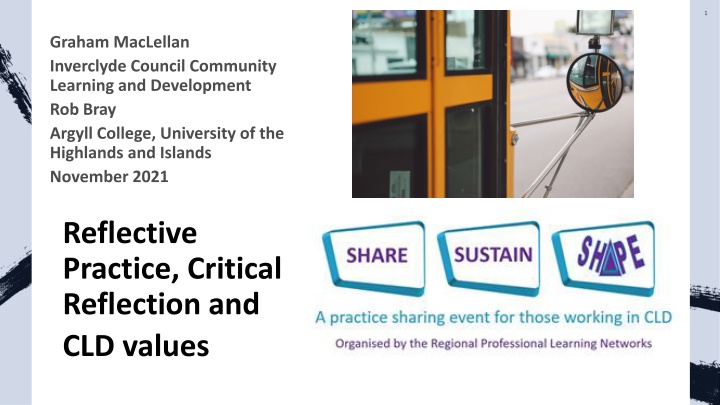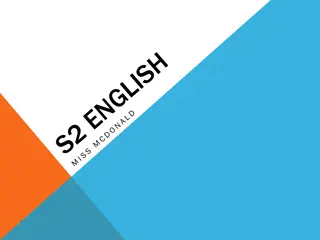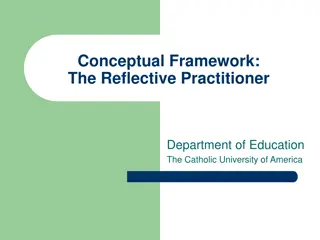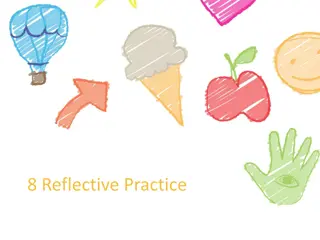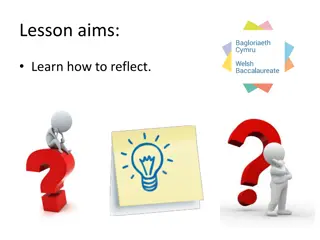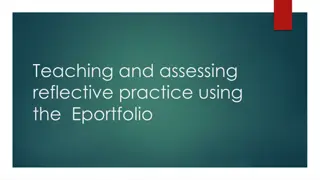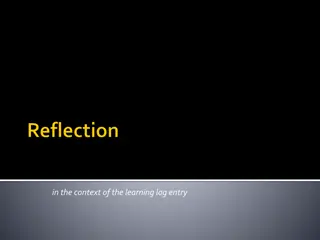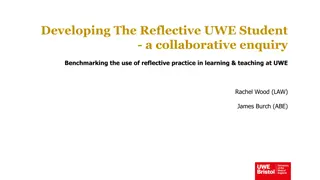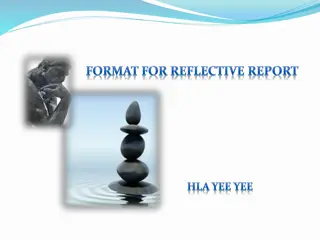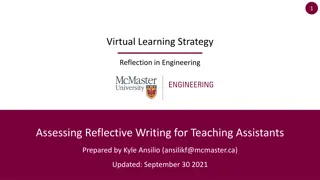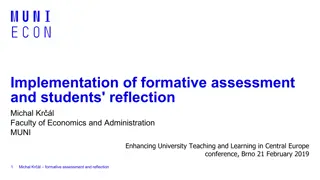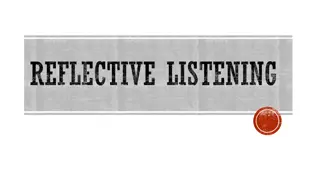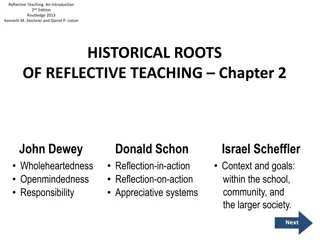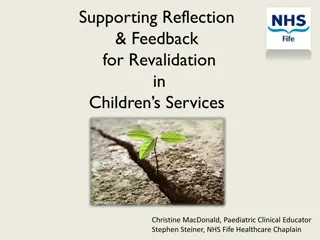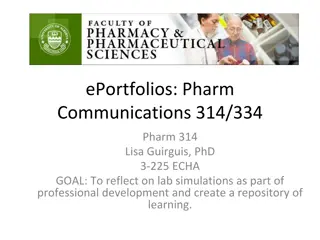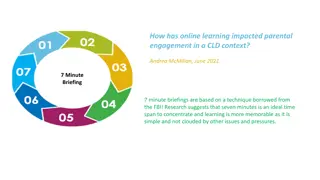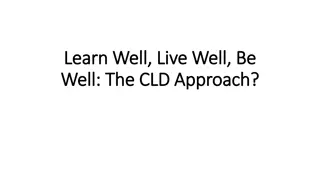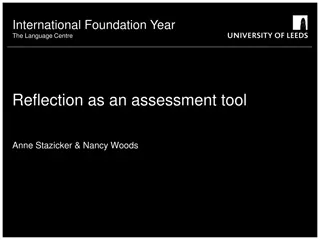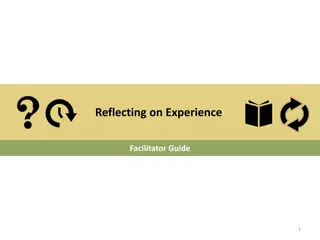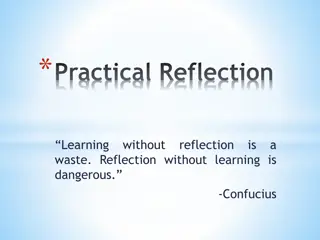Enhancing Reflective Practice Through Critical Reflection and CLD Values
Explore the synergies between reflective practice, critical reflection, and CLD values in professional development for Community Education professionals. Learn how CLD values can support critical reflection in the face of challenges like Neo-liberalism and New Managerialism, ultimately enhancing professional competence and capacity.
Download Presentation

Please find below an Image/Link to download the presentation.
The content on the website is provided AS IS for your information and personal use only. It may not be sold, licensed, or shared on other websites without obtaining consent from the author.If you encounter any issues during the download, it is possible that the publisher has removed the file from their server.
You are allowed to download the files provided on this website for personal or commercial use, subject to the condition that they are used lawfully. All files are the property of their respective owners.
The content on the website is provided AS IS for your information and personal use only. It may not be sold, licensed, or shared on other websites without obtaining consent from the author.
E N D
Presentation Transcript
Reflective Practice, Critical Reflection and CLD values
Part 1 Introduction Who we are Why did we do this CLD values underused Not enough Critical Reflection Aims of this session: To explain why we carried this out this action research To carry out an experiential activity in which participants will explore realistic scenarios using CLD values to develop a Critical Reflective analysis To discuss what developments could be made 2
1. Introduction 2. The theory 1. Reflective Practice and Critical Reflection 2. The impact of Neo-Liberalism and New managerialism 3. CLD Values &The Inverclyde Project The practice: three scenarios activities The toolkit for using Values in Reflective Practice in CE We are going to cover: 3. 4. 3
How CLD values can help Critical Reflection face Neo-liberalism Neo-Liberalism and New managerialism threatening the foundations of CLD Critical Reflection vital challenge but itself increasingly difficult to implement Our values what makes CLD unique can be used to underpin & support Critical Reflection Examples we ll be using CLD values to explore difficult real-life CLD issues in this workshop do they lead to more Critical Reflection 4
5 2 The Theory 2 The Theory 2.1 Reflective Practice 2.1 Reflective Practice and Critical Reflection and Critical Reflection
Reflection: a critical analysis of knowledge and experience, in order to achieve deeper meaning and understanding Reflective Reflective Practice and Practice and Critical Critical Reflection Reflection reflective capacity is regarded by many as an essential characteristic for professional competence. Moon et al (2009) 6
Reflective Practice is often central in professional training programmes for Community Education professionals but on its own discourages perspectives that question existing structures (Smyth 1989) Reflective Practice is essential but dull 7
And in the sort of crisis we re in now you need something more radical
Critical Reflection is 'morally grounded' and requires practitioners to interrogate their deep values and beliefs. It can lead to challenging of assumptions and questioning of organisational norms. Critical Critical Reflection Reflection continued continued 9
It may potentially involve personal and professional risk it may lead to an awareness of contradictions and problems that may be deeply unsettling; internal conflict and denial In group settings, Critical Reflection may be seen as threatening and hazardous; likely to be regarded unfavourably by organisations that are increasingly dominated by a top-down managerialism But that makes it difficult to difficult to implement implement 10
2.2 The 2.2 The Impact of Neo Impact of Neo- - Liberalism and Liberalism and its values on its values on Community Community Education Education Neo-Liberalism: Neoliberalism is generally associated with policies of economic liberalization, including privatization, deregulation, free trade, austerity, 11
Holford (2016): the traditional democratic citizenship model of Adult Education has been entirely snuffed out by neo-liberalism. It is an ideology based on the primacy of the market place in all spheres of life, thereby converting public goods, such as education, into consumption goods (Mayo, 2003, Frazer, 2018). 2 The Impact of 2 The Impact of Neo Neo- -Liberalism Liberalism and its values and its values on Community on Community Education Education - - continued continued 12
New Managerialism is the organisational arm of neo- liberalism (Lynch, 2014). It represents a rejection of traditional models of public sector management, in favour of a business model of quasi- markets and tightening, target- driven management control (Frazer, 2018) and its offspring new new managerialism managerialism 13
This is what CE professionals will experience. Key features of this new managerialism include: increased control and surveillance by managers, and a corresponding weakening of professional autonomy and decision making, 14
Community Education values and practice are undermined The result of The result of all this: all this: where we are where we are now now Increasingly hard to carry out honest Reflective Practice let alone Critical Reflection Does Community Education still exist as a distinct profession? What is to be done? One answer: Return to our core values and use them to stimulate Critical Reflection 15
2.3 CLD values and their relevance 2.3 CLD values and their relevance CLD Standards Council for Scotland Values Self-determination Inclusion Empowerment . Working collaboratively Promotion of learning as a lifelong activity What do they mean? Do they make Community Education unique? 16
CLD values CLD values what do they mean & are they what do they mean & are they useful? useful? Self-determination respecting the individual and valuing the right of people to make their own choices. Inclusion valuing equality of both opportunity and outcome, and challenging discriminatory practice. Empowerment increasing the ability of individuals and groups to influence issues that affect them and their communities through individual and/ or collective action. Working collaboratively maximising collaborative working relationships in partnerships between the many agencies which contribute to CLD, including collaborative work with participants, learners and communities. Promotion of learning as a lifelong activity ensuring that individuals are aware of a range of learning opportunities and are able to access relevant options at any stage of their life. 17
Society, Education and Community Education is in the middle of a number of inter-locking crises. CE practitioners are facing many challenges, not least from New Managerialism Critical Reflection and CLD values provide two potentially powerful tools for practitioners to use in facing these challenges So at Inverclyde we attempted a number of ways to incorporate them into our practice. These eventually developed into a toolkit of methods We d like you to look at three real scenarios and discuss how you might use a Critical Reflection / CLD values approach to tackle them and start to develop solutions Conclusion to Conclusion to Part 1 Part 1 18
Part 3: Moving from theory into practice: Part 3: Moving from theory into practice: three scenarios three scenarios Having presented the problem we are going to invite you to tackle some real examples. There are three scenarios one for each group. Decide in each group how you might use the CLD values to encourage Critical Reflection among CE team members and how this might lead to a way forward 19
SCENARIO 1 FOR DISCUSSION WITH CLD VALUES - The Art Group The Art Group meets all day on a Thursday. Previously started by CLD as a tutor led class 3 years ago. Now supported by a CLD volunteer (attend mornings only). Some members of the group are taking more control of the sessions in recent times, however there is disagreement within the group as to the way forward . Some of the group now want to start selling their art work. It is reported they can do as they wish as they are not connected with the council . The relationships in the group and also with the CLD volunteer have become strained. Most materials for the group are ordered through CLD Admin. As the group is supported by CLD volunteers the group gets free room hire. The CLD department has an issue with the group making a profit from council bought materials. Also an issue: supporting a group that has a business model. (Previous groups who do this in a Co- production model are constituted and have agreement regarding funds). 20
The Art Club scenario 1 and CLD values CLD values Issues Way forward? Self- determination Respect their decisions? Inclusion Are all members having a voice? Empowerment increasing the ability to influence issues that affect them and their communities Collaboration Multiple relationships Life-long learning If it works . 21
Scenario 2 Scenario 2 The Youth Worker The Youth Worker You are a youth worker for a local authority. You have been supporting a group of young people who have formed an LGBT+ group. The group are unhappy with what they perceive is a rise in LGBT+ violence and intolerance within local schools. They are able to give evidence of their experiences ranging from physical violence, derogatory verbal comments made by students and some staff. They have asked for statistics on recorded incidents related to LGBT+ pupils. They are not happy as they feel the schools are not recording the issues properly with many physical and verbal attacks not categorised correctly. They wish to go public with their experiences and the local newspaper is willing to run a series of stories. They have asked you for support to make their voices heard. Your department works largely in schools. Your department is also under consideration for a budget cut of 25% with decisions being made soon. Your team leader is concerned about rocking the boat at a critical time. 22
Scenario 2 The Youth Worker and CLD values CLD values Issues Way forward? Self- determination Inclusion Empowerment Collaboration Life-long learning 23
Scenario 3 Scenario 3 activists and the DWP activists and the DWP You are a community worker in an urban area which is ranked as the most deprived area in Scotland. You have been supporting a group of males aged 50+ who have started a campaign group against Universal Credit. They are unhappy with DWP staff and the expectations being placed on them to find work. You have been supporting them to make coherent and consistent points via social media. The group wish to protest outside the DWP. However your department works closely with the DWP with the adult learning service delivering CV workshops in the Greenock DWP venues and the service relies heavily on referrals from the DWP. 24
Scenario 3 Scenario 3 activists and the DWP: activists and the DWP: CLD values CLD values Issues Way forward? Self- determination Inclusion Empowerment Collaboration Life-long learning 25
Some conclusions and questions How easy is it to apply the CLD values to these situations? Do the CLD values conflict with each other? What skills does the CE practitioner need to resolve any such conflicts? What else? 26
Part 4 Other methods Part 4 Other methods From our experiences we have developed a toolkit of methods It includes the above reviewed and improved Available from graham.maclellan@inverclyde.gov.uk Rob Bray has also been research looking at Reflective Practice in FE. It found a diversity of methods, approaches and barriers Details: rob.bray@uhi.ac.uk Rob is also developing other reflective methods including co-mentoring and learning logs. 27
References References Fook, J. (2015). Reflective practice and critical reflection. Handbook for practice learning in social work and social care, 440-454. Mann, K., Gordon, J., & MacLeod, A. (2009). Reflection and reflective practice in health professions education: a systematic review. Advances in health sciences education, 14(4), 595. Brookfield, S. D. (2017). Becoming a critically reflective teacher. John Wiley & Sons. Fraser, G. (2018). Foucault, governmentality theory and Neoliberal Community Development . Community Development Journal. CLD Standards Council Scotland (2018) Values of CLD. http://cldstandardscouncil.org.uk/reso urces/values-of-cld/. Accessed 12 July 2018. Mayo, P. (2003). A rationale for a transformative approach to education. Journal of Transformative Education, 1(1), 38-57 Holford, J. (2016). The misuses of sustainability: Adult education, citizenship and the dead hand of neoliberalism. International Review of education, 62(5), 541-561. Education Scotland (2017). How good is the learning and development in our community. Livingstons, Education Scotland Sch n, D. (1983) The Reflective Practitioner, New York: Basic Books Smyth, J. (1989) A critical pedagogy of classroom practice. Journal of Curriculum Studies, 21(6), 483-502. Housdon, P (2016) Rethinking Public Services. The Centre for Public Impact . Bray, R., & MacLellan, G. (2019). Critical Reflection and Community Education Values. Concept, 10(1), 11- 11. 28
